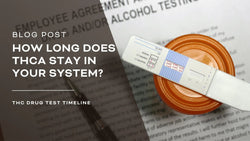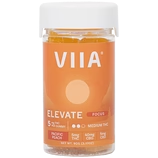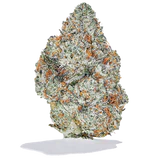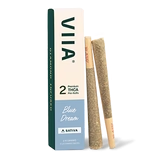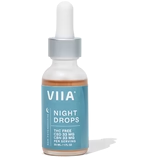
What Is THCV? Benefits, Effects, and More
THCV (Tetrahydrocannabivarin) is a minor cannabinoid found naturally in the cannabis sativa plant. Discovered in 1973, THCV interacts with the same receptors in your brain as THC, but it’s only about one-quarter as psychoactive—meaning the high isn’t as intense [1].
You might come across THCV, often nicknamed "diet weed," because some people say it helps curb their appetite. This nickname comes from anecdotal reports and early research into its effects on hunger.
Certain varieties of cannabis, such as those from Central Asia and Southern Africa, tend to have higher levels of THCV naturally, as not all strains contain the same concentration of cannabinoids.
What Are the Potential Benefits of THCV?
There’s still a lot to learn about THCV. It’s not as well-researched as CBD or THC, but with more interest placed in cannabis for natural wellness, we're sure to see a lot more in expanding our understanding of the potential wellness benefits of cannabis components.

Here’s what some people have reported about THCV, and we've compiled some studies that might be able to explain how this could work.
- Sleep Support: At lower doses, THCV may help promote better sleep. While research on this is limited, some anecdotal reports suggest that THCV may help individuals fall asleep faster and enjoy more restful sleep. A study found that cannabinoids can influence sleep cycles, but more research is needed to get a complete picture of THCV's role in sleep [2].
- Immune System Support: As a cannabinoid, THCV may support a healthy immune system by interacting with the endocannabinoid system, which maintains the balance of many physiological systems, including the immune response. Again, direct studies on THCV and immune health are limited, but research does suggest that cannabinoids help strengthen communication within the ECS to support overall wellness [3, 4].
- Appetite Suppression: In the cannabis community, THCV has picked up the nickname "diet weed" because of its supposed potential to curb one's appetite — this is a distinct effect from THC, which tends to bring on "the munchies." One study on rodents found that THCV reduced food intake and weight gain [5]. According to Dr. Saoirse O’Sullivan, a researcher and scientific advisor, THCV can block the CB1 receptor, which stimulates appetite, suggesting that THCV might alter how the brain responds to food stimuli. However, it may not significantly change appetite or body weight in humans.
- Mood Support: Some users report that THCV helps them feel more focused and uplifted, which may support overall mood. THCV’s potential to act as a CB1 receptor antagonist at lower doses may contribute to these uplifting effects, offering mental clarity without the heavy, sleepy feeling that THC or CBD sometimes causes. In a 2018 review published in the Journal of Cannabis Research, it was noted that cannabinoids like THCV could potentially influence mood by modulating serotonin and dopamine levels [6]. However, more research is needed to validate this hypothesis.
Can THCV Help You Lose Weight?
THCV isn't a weight loss drug, nor does it work like those influencer-marketed "diet teas." While some research suggests that THCV might help reduce appetite and influence lipid and glucose metabolism, most of this research has been conducted on animal models, such as rodents, in controlled environments [7].

For example, studies have shown that THCV can affect glucose metabolism in murine models, but translating these effects to humans is much more complicated. A randomized, double-blind, placebo-controlled study on humans found that while THCV had some promising effects on metabolic markers, it didn't significantly impact appetite or body weight [8].
Approach THCV with realistic expectations regarding weight loss.
Weight management is a complex process in humans, influenced by factors like genetics, environment, and stress levels. There isn’t enough substantial evidence to classify THCV as a weight-loss cannabinoid for humans. The promising results seen in murine models may not directly translate to similar outcomes in people.
What Does THCV Feel Like?
The effects of THCV are dose-dependent, meaning they change based on how much you take. Of course, other factors are at play, such as your body chemistry, metabolism, and experience with the cannabis plant.
Still, to give you an idea, we've set out a short guide on what you may expect from tetrahydrocannabivarin (THCV) at varying doses.
- At Low Doses: THCV acts as a CB1 antagonist in the endocannabinoid system. This is the same receptor that THC has an affinity to, yet it doesn’t produce the psychoactive effects typical of THC. It may even suppress appetite, which makes it a potential tool for those looking to manage their weight.
- At High Doses: When you ramp up the dose, THCV acts more like THC, binding to the CB1 receptor and producing psychoactive effects. However, the high is different — it’s often described as stimulating, energizing, and mentally clarifying. People say it’s "fast-acting" but also "fast-dissipating."
- Distinct High: The euphoria from THCV is different from THC’s. It’s more focused and mentally clear, without the heavy feeling that THC sometimes brings. The effects generally last between 30 minutes to 1.5 hours, making it shorter-lasting compared to THC.
A Closer Look At The Effects of THC vs THCV
At first glance, THC and THCV may seem similar—they even share part of the same name. However, they differ significantly, from their chemical structures to their effects on your body.

- Concentration: THCV is typically present in much lower concentrations in cannabis plants compared to THC (less than 0.1%).
- Chemical Structure: THCV has a different chemical structure, which changes how it interacts with the body.
- Effects: While THC is known for its relaxing, euphoric high, THCV’s effects are more energizing and clear-headed. It’s less likely to make you feel “stoned.”
- Availability: You’ll often find THCV in trace amounts in full-spectrum CBD products. It works well with THC and CBD to create a balanced effect profile, but because it's still a fairly low-key cannabinoid, it's not as popular yet to find THCV-centered products.
Safety Profile of THCV
Natural cannabinoids like THCV are generally safe and non-toxic for most people. However, it’s always wise to know how your body reacts to new cannabinoids.
If you’re interested in trying THCV, make sure you’re buying from a reputable source.
Always look for third-party lab tests to ensure quality and purity. This is especially important for less common cannabinoids like THCV, as the market can sometimes be unpredictable.
Specifically, check for a contaminant report and the concentration of other cannabinoids and terpenes.
A contaminant report will show if the product is free from harmful substances like pesticides, heavy metals, and residual solvents. This is especially important for less common cannabinoids like THCV, as the market can sometimes be unpredictable.
Meanwhile, the concentration of other cannabinoids and terpenes gives a better idea of the product's full-spectrum profile and potential effects.
The Takeaway: Tetrahydrocannabivarin (THCV)
THCV is an intriguing cannabinoid that reminds us there’s still so much to explore within cannabis research and the diverse experiences the plant can offer. From appetite suppression to mood support, THCV has some interesting effects that set it apart from THC and CBD.
Some people report that it has an energizing, mentally clarifying compound. THCV is found in some of our VIIA products, like our popular THC Libido High Love Gummies and our High Love THCA Vape - Aphrodisiac Blend, which adds a balanced edge to the full-spectrum formula.

As with any cannabinoid, start with a small dose and see how your body responds. And always choose products that are backed by quality and transparency.
Resources:
- Pertwee, R. G. (2006). Cannabinoid pharmacology: the first 66 years. British journal of pharmacology, 147(S1), S163-S171.
- Low, Z. X. B., Lee, X. R., Soga, T., Goh, B. H., Alex, D., & Kumari, Y. (2023). Cannabinoids: Emerging sleep modulator. Biomedicine & Pharmacotherapy, 165, 115102.
- Zou, S., & Kumar, U. (2018). Cannabinoid receptors and the endocannabinoid system: signaling and function in the central nervous system. International journal of molecular sciences, 19(3), 833.
- Gojani, E. G., Wang, B., Li, D. P., Kovalchuk, O., & Kovalchuk, I. (2023). Anti-inflammatory effects of minor cannabinoids CBC, THCV, and CBN in human macrophages. Molecules, 28(18), 6487.
- Abioye, A., Ayodele, O., Marinkovic, A., Patidar, R., Akinwekomi, A., & Sanyaolu, A. (2020). Δ9-Tetrahydrocannabivarin (THCV): a commentary on potential therapeutic benefit for the management of obesity and diabetes. Journal of cannabis research, 2, 1-6.
- Bloomfield, M. A., Ashok, A. H., Volkow, N. D., & Howes, O. D. (2016). The effects of Δ9-tetrahydrocannabinol on the dopamine system. Nature, 539(7629), 369-377.
- Wargent, E. T., Zaibi, M. S., Silvestri, C., Hislop, D. C., Stocker, C. J., Stott, C. G., ... & Cawthorne, M. A. (2013). The cannabinoid Δ9-tetrahydrocannabivarin (THCV) ameliorates insulin sensitivity in two mouse models of obesity. Nutrition & diabetes, 3(5), e68-e68.
- Abioye, A., Ayodele, O., Marinkovic, A., Patidar, R., Akinwekomi, A., & Sanyaolu, A. (2020). Δ9-Tetrahydrocannabivarin (THCV): a commentary on potential therapeutic benefit for the management of obesity and diabetes. Journal of cannabis research, 2, 1-6.
